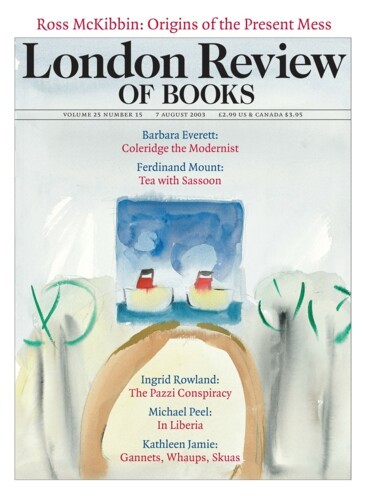Stendhal once observed that to introduce politics into a work of fiction was like firing a pistol during a performance in the theatre, a loud and unwanted intrusion of the real on a setting all calculated artifice. The analogy was brought to mind two weeks ago by the death of David Kelly, a real event which intruded in a shocking way on the calculated artificiality of the Parliamentary Foreign Affairs Committee before which he’d been called, a body convened on the face of it to determine whether the Government had earlier misled all of us in persuading itself there needed to be a war; or whether, less seriously and once the war was over, a BBC journalist had misled rather fewer of us about the degree and nature of the Government’s duplicity. It had seemed all along that to appoint a group of MPs, proportionally representative of the Government majority in the House of Commons, to decide the question of whether Blair & Co. or the BBC were to be blamed for exaggerating certain details in the Intelligence reports on Iraqi weapons, was quite wrong. How wrong became doubly apparent when, following all too immediately on Dr Kelly’s death, our footloose Prime Minister paused on his way to open a new branch of Tesco’s in Tokyo and announced that a ‘senior’ judge would now be asked to look into the circumstances which precipitated that sad event.
And all this hinging, as by the rules of our Parliamentary play-acting it had been led to do, on an assertion which in a less artificial world would have counted for nothing, that the Iraqi weapons imagined to be pointing in our direction could have been brought into use within 45 minutes, or to put that less sexily, within three quarters of an hour. That assertion had a spurious ring from the word go, its arbitrary precision suggesting it had been elicited from, and not volunteered by whoever was its source – the age-old spinner’s gambit of asking an expert whether such a thing is possible and then, on being told yes, it’s possible, adopting it, expert caveats notwithstanding, for the unworthy purposes that Blair’s 45 minutes were adopted: as evidence waiting to be put before an impressionable nation so that an already dodgy dossier can be made that little bit dodgier. Those of us who remember the four-minute warning, the brief window of opportunity we were told was all we would enjoy between being alerted to an upcoming nuclear attack and its arrival, might well reflect that the 45 minutes, had they been a reality, would have seemed on the leisurely side: mildly reassuring evidence that the Iraqis weren’t quite as quick on the technological draw as they should have been.
Whether it was the Government that spun the Intelligence evidence it had received or, subsequently, the BBC that spun, should never have become the issue it has become, to the point where the BBC may suffer lasting damage at the hands of a vindictive regime. The hard fact is that the evidence, whether spun or unspun, was, we’re now entitled to believe, false, and in my own view (see Short Cuts, 19 June) is likely to have been sufficiently negative in respect of Iraq’s capabilities to smooth the way to the launching of a low-risk war. Nevertheless, the 45 minutes have been written indelibly into the script of the unholy theatrical performance which threatens to run and run, along with the deal that never was between Iraq and Niger to buy uranium, a deal which Professor Norman Dombey suggested last year in the LRB (17 October 2002) could very easily have been an Intelligence sting, if a peculiarly pointless one, since Iraq already had, as Dombey pointed out, ‘hundreds of tons of uranium at its disposal’. It involved what was by all accounts an elementary forgery, which should have taken in no one at all, but for which our Government was happy to fall, its lack of scepticism further evidence that when you are set on having a war, you don’t analyse what you learn from Intelligence services too carefully in case it puts you off.
Meanwhile, the delusional cast of mind of those who ordered our Armed Services into action on a false prospectus appears to be spreading, no doubt being seen in high places as a sound qualification for anyone who may now be angling to land a job sorting things out in Iraq itself. Thus the man who has been put in charge of a body called the Iraq Industry Working Group was quoted last week as saying that within quite a short time – as little as three years, he thought – Iraq could be turned from the unhappy scene of murderous disorder and deprivation it currently is into a tourist venue, containing, as he reminded us, such recently overlooked destinations as the ‘birthplace of Abraham’ and the Hanging Gardens of Babylon, even if these particular sites might need a spot of making over by the people you see on television doing that sort of thing in the English suburbs. Why, on the other hand, wait even three years to open the country up to tourists, when you could start easyJetting them in straight away and offer them their own weight in air miles if they manage while they’re there to do what no one else has done and finger the missing weapons?
Send Letters To:
The Editor
London Review of Books,
28 Little Russell Street
London, WC1A 2HN
letters@lrb.co.uk
Please include name, address, and a telephone number.

